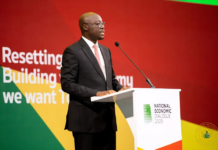
The World Bank Group says it is confident the new Ministry of Business Development will propel Ghana’s efforts to be more competitive in global trade.
According to the World Bank, latest reports indicate that Ghana still lags behind in the ease of doing business, despite some interventions in the public and private sectors.
“It is a very strong signal that the government has created that ministry; it is a signal that the issues of the private sector will be of high priority for the government. We have also been very encouraged by the words of the President in this regard,” the Senior Director of Global Practice on Trade and Competitiveness at the World Bank, Anabel Gonzalez told Citi Business News. Businessman, Ibrahim Mohammed Awal has been appointed as the Minister Nominee for the Business Development ministry.
His mandate is to develop and deal with the challenges of Ghana’s business community. The 2017 ease of doing business report stated that Ghana has inched up by three points between 2016 and 2017. The country rose from the 111th to the 108th position out of 190 countries studied across the globe, within the one year period.
This was based on some interventions made by the country in the registration of businesses among others. Nonetheless, Ghana scores poorly in indicators related to Trading across Borders (154th), Getting Electricity (120th), Paying Taxes (122nd) and Resolving Insolvency (155th).
But the Senior Director of Global Practice on Trade and Competitiveness at the World Bank, Anabel Gonzalez says the new ministry could strengthen the institutional framework to develop the private sector. “Ghana is a country that has huge potential.
It is important to address this by being constraint to unleash that potential in going forward. And one aspect that we find very crucial in doing this is establishing this institutionalized style between the government and the private sector,” she said.
“So we look forward to the opportunity that the new administration encounters to actually build on the experience of other countries as well and strengthen these institutional coordination mechanisms with the private sector.”



























